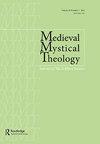Divine Ideas and the Dependent Nature of Creation
IF 0.3
0 RELIGION
引用次数: 0
Abstract
ABSTRACT In the first part of this essay, I explain why Aquinas thinks that it is better to understand ‘creation’ as a relation rather than a change, and I establish what it means in Christian theology to say that the world depends on God. I then argue that one of the most philosophically and theologically persuasive ways of articulating this relation of dependence is via the Platonic metaphysics of divine ideas. Through a careful reading of Aquinas and Eckhart, I respond to some of the pantheistic fears which led to the virtual disappearance of the divine ideas paradigm in the Christian tradition after the medieval period, and argue that a keen sense of our own ontological fragility is a good thing – both metaphysically and spiritually.神圣思想与创造的从属本质
摘要在本文的第一部分,我解释了为什么阿奎那认为最好将“创造”理解为一种关系而不是一种改变,并确立了世界依赖上帝在基督教神学中的含义。然后,我认为,阐明这种依赖关系的最具哲学和神学说服力的方式之一是通过神圣思想的柏拉图形而上学。通过仔细阅读阿奎那和埃克哈特,我回应了一些泛神论的恐惧,这些恐惧导致中世纪之后基督教传统中的神圣思想范式实际上消失了,并认为对我们自身本体论脆弱性的敏锐感觉是一件好事,无论是在形而上学上还是在精神上。
本文章由计算机程序翻译,如有差异,请以英文原文为准。
求助全文
约1分钟内获得全文
求助全文

 求助内容:
求助内容: 应助结果提醒方式:
应助结果提醒方式:


